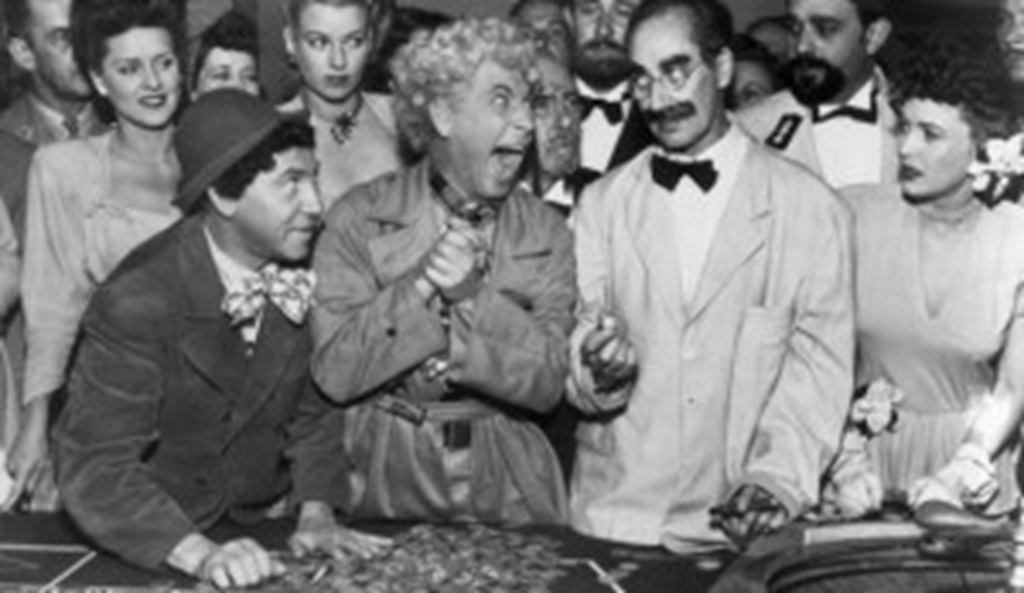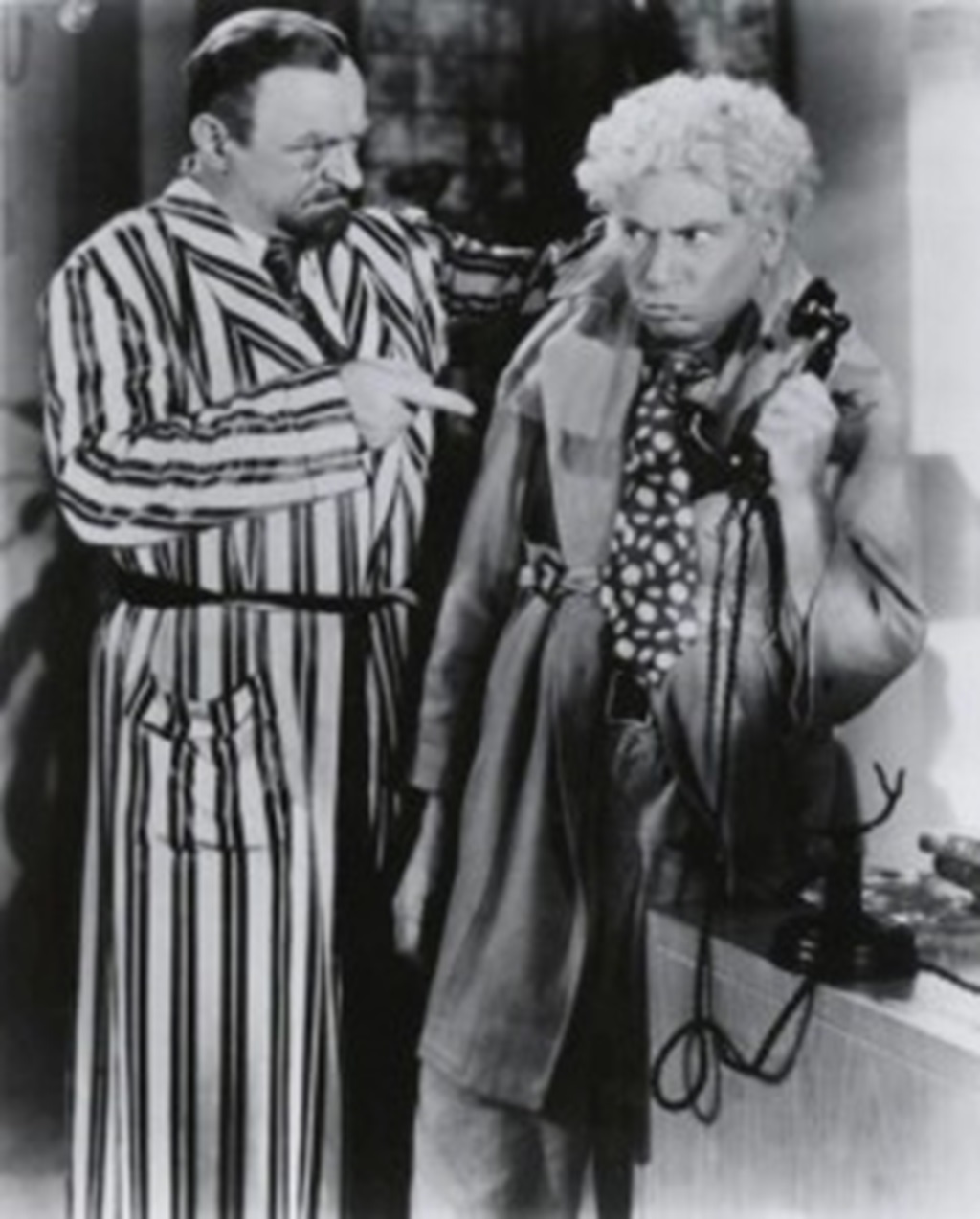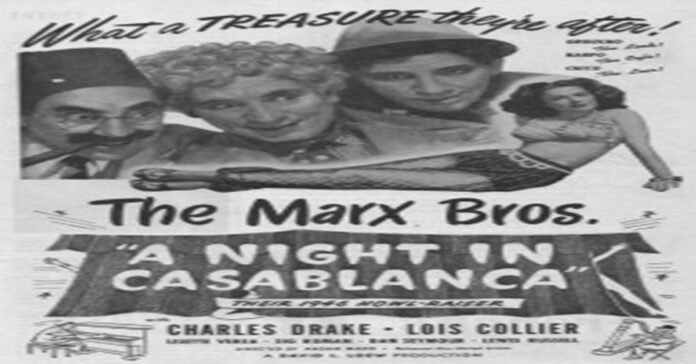“A Night in Casablanca” is a classic comedy film released in 1946 and directed by Archie Mayo. Known for its wit, humor, and clever plot twists, the movie showcases the timeless charm of the Marx Brothers – Groucho, Chico, and Harpo.
Set against the backdrop of post-World War II Casablanca, the film follows Ronald Kornblow, played by Groucho Marx, as he takes on the manager role at a hotel plagued by mystery and intrigue.
Mayo, the director, brings his skillful touch to the film, blending slapstick humor with a hint of romance and suspense.
With the Marx Brothers at their comedic best and Mayo’s direction, “A Night in Casablanca” remains a delightful cinematic gem that continues entertaining audiences with quick-witted dialogue and memorable moments.
Also Read More: Vivienne Marie Wikipedia And Age: Who Is She On Chicago Fire?
“A Night in Casablanca”: A Timeless Comedy Directed by Archie Mayo
Let’s start by dispelling a common misconception: A Night in Casablanca was not produced to settle Chico Marx’s gambling debts.
Chico’s financial needs were ever-present, but Groucho and Harpo were eager for a cinematic comeback after their lackluster MGM film, The Big Store (1941).
The catalyst for their return was David L. Loew and the promising prospects of independent production.
The brothers teamed up with Loew to establish Loma Vista Productions, with United Artists handling distribution for their modestly budgeted project.
Released in May 1946 to mixed critical reception but solid box office success, A Night in Casablanca marked a fitting conclusion to the Marx Brothers’ film career.
Regarded as one of their best works since A Night at the Opera (1935), this postwar adventure showcased the trio’s brilliance and recaptured the raw spontaneity of their early Paramount comedies.
Before its DVD release in 2004, A Night in Casablanca had a somewhat elusive history in the videocassette market.
It briefly appeared through Independent United Distributors in 1983 and later as a budget release by GoodTimes in 1990.
Eventually, the copyright owner of Castle Hill Productions collaborated with Warner Home Video to deliver an excellent quality, long-overdue remastered film version.

Interestingly, there’s a comic twist related to Warner Home Video’s involvement. In 1945, Warner Bros. expressed concerns about A Night in Casablanca’s storyline, fearing it might mimic their 1942 classic drama.
Groucho responded with a now-famous letter to Warner, read at the Library of Congress’s bicentennial celebration in 1997.
In a humorous tone, Groucho questioned Warner’s claim to “Casablanca” and cheekily asserted the Marx Brothers’ longstanding use of the term “Brothers.”
While Groucho admitted the correspondence was a publicity stunt, the Marxes avoided direct parody of the iconic Bogart-Bergman film, except for a nod to it with the “round up all likely suspects” line and Harpo’s lively roulette wheel scene.
A standout feature distinguishing “A Night in Casablanca” within the later Marx Brothers’ endeavors is the resurgence of Harpo’s anarchistic brilliance, which had been subdued since “Duck Soup” (1933).
The B Grade Plot
With uncredited contributions from Frank Tashlin, Harpo takes center stage from the outset, dominating the film with his iconic collapsed building sight gag.
Departing from the MGM musical and romantic elements, director Archie Mayo, known for films like “The Petrified Forest” (1936) and “Black Legion” (1937), opts for a more free-wheeling approach in “A Night in Casablanca.”
Groucho, playing the irreverent hotel manager, and Chico, cast as a taxi car driver, make their entrance 10 minutes into the film, giving Harpo a long-overdue free reign.
Set primarily in the Hotel Casablanca, the movie unfolds a B-grade plot involving an escaped Nazi, Heinrich Stubel, portrayed by character actor Sig Ruman.
While the narrative might seem unconventional for the Marx Brothers in a postwar setting, the chaotic antics inside the hotel evoke a reminiscent charm of their first film, “The Cocoanuts” (1929).

The film’s climax, involving the Marx Brothers on a Nazi plane, takes on a deeper meaning, according to art historian Erwin Panofsky, who sees it as a symbolic representation of man’s behavior in the atomic age.
Despite initial doubts, “A Night in Casablanca” became an unexpected hit in 1946, raking in $2.7 million in worldwide ticket sales and becoming the highest-grossing film of their career.
The trio’s renewed box-office success prompted a temporary retirement from the silver screen, with their final film as a team being “Love Happy” in 1949.
Despite critical reservations, “A Night in Casablanca” is a more commendable film than its reputation suggests, culminating in the Marx Brothers’ departure.
Also Read More: Cardell Hayes Wife: Is Will Smith Shooter Married? Family Details

